If you missed Part 1 or Part 2, go back now and read them first!
In Part 1, we identified a potential problem with our current path.
In Part 2, we explored success, failure, and how to avoid measuring the wrong things in an attempt to identify and ultimately reach our north star: ensuring power naturally accrues to individuals, not single entities.
This is Part 3. How do we go from where we are today to where we need to be tomorrow?
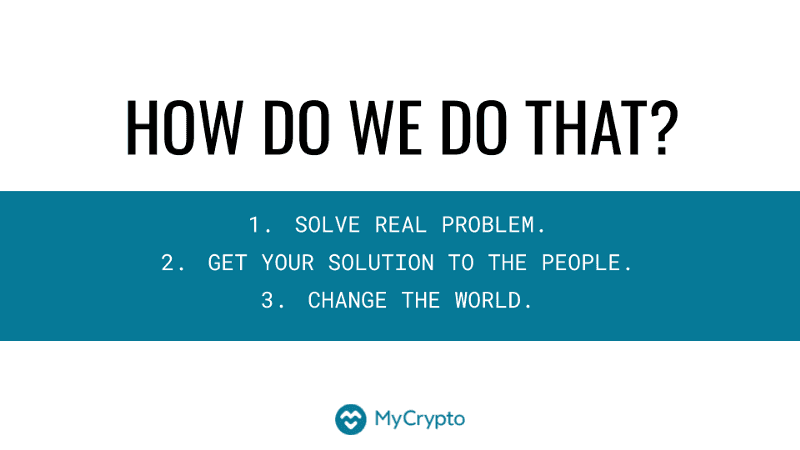
How do we go from where we are today to where we need to be tomorrow?
So, it’s a very simple process when you put it on a slide like this. It turns out, it’s much harder to execute successfully. But, essentially, you are going to need to find a problem, solve that problem, get your solution into the hands of the people who have that problem, and then you’ve changed the world. 💪
The first step is hard enough, but the second step is nearly impossible. It’s not enough to just create something valuable. It’s not enough to have the best features or the best design. A lot of people here know just how difficult it is to get people who aren’t already in this ecosystem, who don’t understand the technology, to understand and use our products. Luckily, there are some things that can help with adoption:
- Having a clear, recognizable use case.
- Utilizing innovative technologies to solve a (common) problem.
- Make it easy to access, explore, experiment.
- Supply awareness.
- Lower, or eliminate, the risks.
Generally speaking, we’re missing most — if not all — of these items. But the one I think we are slightly okay at, and can easily be much better at with a little time and dedication, is awareness.
The nice thing about awareness is that you don’t have to be an engineer, have an MBA, or even be in marketing. We all got into this space somehow. We can think back to what attracted us originally, what attracts us now, and share that story with others. We can use our passion to share a story with others and help them get in. Anyone can do this.
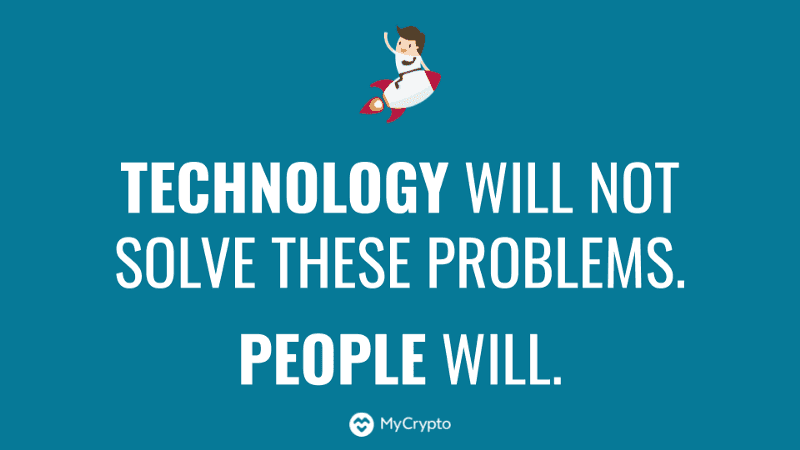
At the end of the day, technology is not the sole driver of awareness, adoption, better products, and useful solutions. People will be the driving force behind all of these things. People will solve other people’s problems and people will make the world a better place for people.
Whenever we look at adoption and change in society, we see some common patterns.
We see people collaborating. All members of a system get involved and work together to initiate a change.
We see people sharing information and educating others. This sharing of knowledge encourages people to think more deeply and empowers them to also get involved.
We see a shared experience and a shared vision that allow people who aren’t involved to get involved, and those who are involved to become fully invested in the process.
And lastly, we see that change is realized over time and ripples outward. Until the change is fully realized, everyone’s journey is personal and individual. This is why it’s so common to hear people say, “…and then I fell down the rabbit hole.”
It all starts on an individual level before spreading to the person’s family or closest inner circle. This ripples outward to their community — maybe the 100–200 closest to them — whether that be close in physical proximity or via an online forum where users’ interests or values are close.
As one person shares with their community, those individuals in the community go through the same process. They share with their families and then their own communities. And eventually the societal norms, the culture, the way of life, the things we think and believe change across all of society.
How do we initiate this change though, even on the individual level?
Again, historically, there are a few common ways that ideas are shared, passed down, or evolved over time.
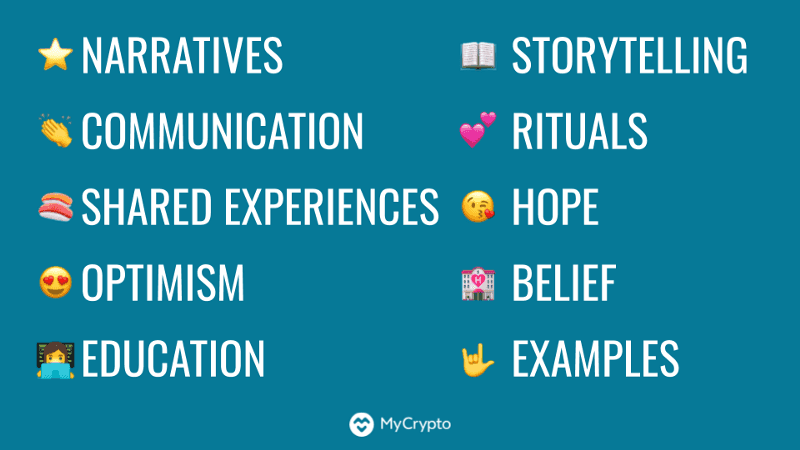
We talk, we tell stories and we share narratives. Stories are so easy to share with others and easy to remember. They can be adjusted for different age groups or cultures or languages while retaining their meaning on a deeper level. Adults may hear a story that is complex and striking and full of real people and places and history, while children may be taken in by fables with talking animals and races through the forest and silly names.
We also see that shared experiences are powerful. Rituals, traditions, coming together, and especially overcoming difficult or traumatizing events with each other connects us and brings us closer.
And lastly, shared belief, hope, and optimism keeps everyone going even when things get tough. It prevents loneliness from causing you to give up. Belief and hope are magical elements that defy logic and reason and make it okay when you can’t see the light at the end of the tunnel.
One additional note: people tend to hang out with people similar to them — similar upbringings, similar locations, similar experiences. We naturally connect more easily with those who are like us. However, in order to have a diverse, thriving, and robust system that works for everyone, we need to share with those who are different from us, or the ecosystem will be limited to those who think like us, act like us, have the same specific problems, and communicate like us. This will limit our scope of influence and will not likely result in deep, societal change.
If our shared ideology, philosophies, and values aren’t robust enough, it is easy for a new set of people to dominate an early ecosystem and transform it into something unrecognizable. This will result in an outcome that is very different than the initial goals, aka failure.
So, while it’s necessary to have a diverse ecosystem, we should not attempt to grow too fast. Mass adoption will come over time and by growing in a way that allows our ideas to evolve and grow stronger in response to threats, but not be overtaken.
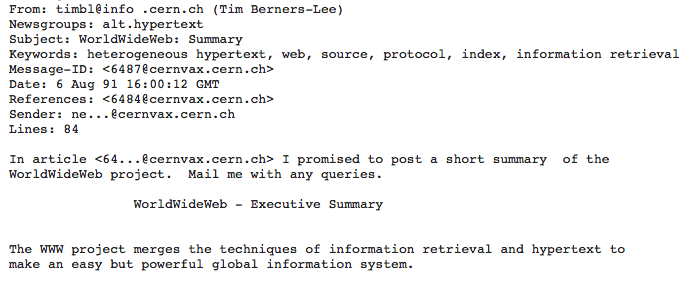
Again, we can look at the early web, specifically Usenet newsgroups, to see how damaging growth can be.
Usenet newsgroups were among the first forms of online communities. Early internet users used this platform to come together for healthy discourse and the sharing of information. Each September, there would be an influx of new users, as teenagers started college and gained access to the internet for the first time. During these yearly influxes, the socialization task was manageable. The new freshman would arrive with their existing expectations and attitudes, and the existing users would yell, “lurk moar!” Eventually, the newcomers would engage in a manner that was more similar to the existing users, and the community would thrive again.
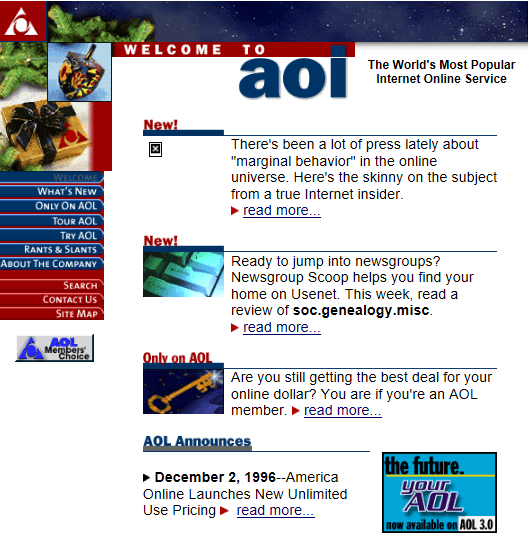
However, in September of 1993, AOL added a link to Usenet on their dashboard and “unleashed millions of their internet-with-training-wheels subscribers on Usenet”.
This flood of new users had no regard for the established cultural norms and they were seen as uncivil and rude by existing members. Today, we would call them trolls, griefers, etc.
Unlike the September influxes that had come previously, the existing community couldn’t acculturate all of them and the quality of these groups declined significantly.
We need to be explicit: This wasn’t an external or deliberate attack by AOL or AOL users. The system and the technology did exactly what it was designed to do. However, the system could not account for the very real and very human desires of existing members. At the end of the day, the original intentions of the early adopters and creators of these communities were lost.
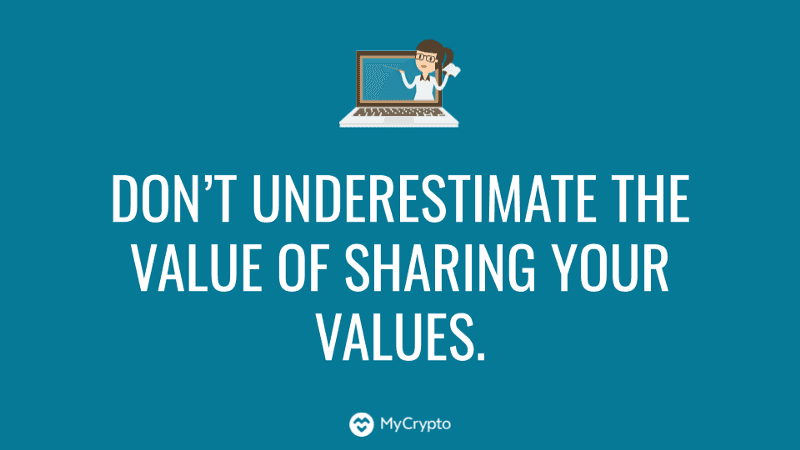
For these reasons and more, we should not underestimate the value of sharing our values.
We should be sharing more, not less, as the system grows. A lot of times we want to abstract things away and hide how the sausage is made. However, we are not there yet. It’s massively important that we share our philosophies and passion because the people entering the space today, tomorrow, or next year can help us stay on a correct path and eventually will share their own passion with other newcomers.
We shouldn’t think of it in terms of “us vs. them.” It’s “us with future us.” That’s where the power really is.
We need to successfully acculturate new people. Not just because you like the community we have built, but because the system is very much a work-in-progress and still relies heavily on people to create it realize the vision. When our community becomes a society, the society needs to be new, robust, and different than the existing society we live in. The incentives have to be perfect and the work left to be done needs to be able to be accomplished on a much slower timeline.
(Start here if you want more of this. It’s an endless subject.)
As we continue this journey, we need to be open and honest with each other and with ourselves. Honesty is one of the most powerful tools that we have and is especially powerful when we are together, in person, at conferences, and at meet-ups.
This honesty will enable accountability for all parties involved but, most of all, ourselves. This will ensure our products and the systems we are building become as robust as possible.
Thank you for reading!
–Taylor 💖
References & Further Reading
- Taylor Monahan @ Devcon 5 // Video version of this article
- Tokenization of Everything
- a16z Podcast: From the Internet’s Past to the Future of Crypto
- https://twitter.com/Melt_Dem/status/1177624330278199297
- For tech giants, a cautionary tale from 19th century railroads on the limits of competition
- Cryptocurrency Might be a Path to Authoritarianism
- LessWrong: What Failure Looks Like
- Attacked from Within
- The Reverse of Stupidity is not Intelligence
- The Four Desires Driving All Human Behavior: Bertrand Russell’s Magnificent Nobel Prize Acceptance Speech